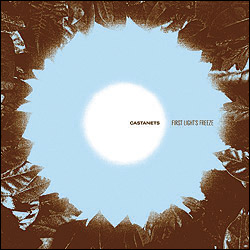CASTANETS
First Light’s Freeze
(Asthmatic Kitty)
Even though Cat Power and Smog made it seem so, it’s not that easy to make a bunch of chords and a slow, hushed voice sound inspired. It’s like a white-on-white painting: Work of this kind becomes about light and texture, how the gestures lie, and how the work converses with the other objects in the room. Castanets’ main man, Raymond Raposa, might seem like he’s leaching color from the palette begun with his beginner’s masterpiece, Cathedral, but it sounds more like he’s moving away from obvious genre association. All the weirdo beardo stuff goes new wave via Kid A on First Light’s Freeze, coming not even a year after the debut but with a pronounced sense of urgent minimalism. It begins unimpressively on “Into the Night,” where war-damning is rendered as hesitance, as is the music, which feels a lot like Low. A musical relation to Br. Danielson of the Danielson Famile sneaks in on “A Song Is Not the Song of the World,” with tricky, fast-turned phrases like “I put this day together/Out of fear and in blue weather/It kept me from feeling clever/I cannot put these things together, so who’s the world?” sung mantralike over a synthy, timepiece beat. “Dancing With Someone (Privilege of Everything)” settles on Raposa’s rasp- addled, antiquated plainspeak, like he’s reading private letters on the History Channel. Therein lies the charm: Raposa has found a way to make the bleak and plain worth listening to—when you get up close, there really is a lot going on there. DAPHNE CARR
BREAKESTRA
Hit the Floor
(Ubiquity)
L.A.’s Breakestra pulled off a strange kind of stunt with 2001’s The Live Mix, Pt. 2. The album existed as a showcase for a group of ultra-tight funk aficionados to more or less re-create verbatim a handful of the building-block sampled hooks of hip-hop’s first decade and a half. The end result was like listening to a live cover version of a continuously mixed Ultimate Breaks and Beats album, and the funk-to-hip-hop-and-back-again meta of it all was a little disorienting, if not a touch obvious. (That said, they were also really good at it.) The neo-rare-groove movement has gained momentum since then, good timing for Breakestra’s first album of original-ish material. The problem is, they’re playing with a preservationist ethic instead of a zeitgeist, and there are more than a few songs here that feel better suited as callbacks than their own entities, a Crooklyn soundtrack that can’t get the record company rights. Shake-your-whatever grooves like “Stand Up” and “Show and Prove” sound so reverent to the sound of the circa-’70s J.B.’s and Meters that they’re scared to go wild like “The Grunt” or “Look-Ka Py Py” really did. It’d probably sound less worn out if the title track didn’t own the entire record: After almost an hour of autopilot, it shows up as the finale, quadruples the energy and humidity, and rides on MixMaster Wolf’s gravelly paean to ’63 Impalas and the greatness of P-Funk guitarist Eddie Hazel. It’s like some glorious what-if that pictures Wilson Pickett doing hot-rod anthems, and it single-handedly tricks you into thinking you just heard a great album instead of an innocuous one. On a brighter note, once sampling catches on again in 2020 or so, this baby’s gonna be a gold mine. NATE PATRIN
Breakestra play Crocodile Cafe with Ohmega at 9 p.m. Tues., Dec. 20. $15.
ELBOW
Leaders of the Free World
(V2)
In Britain’s world of insufferable male songbirds, Elbow’s Guy Garvey just hasn’t whined loudly enough. But if label drama hadn’t prevented the band’s stunning debut, Asleep in the Back, from coming out before Coldplay’s Parachutes, maybe Garvey would be tucking some little Apple in and Chris Martin would be avoiding piano-driven ballads like the scourge they’ve become. Instead we get Leaders of the Free World, the third in Elbow’s attempt to carve a market niche by toning down their epic misery in favor of the tastefully crafted and miserably epic—a difference in subtlety that Elbow are beginning to miss. Like American songwriters John Vanderslice or latter-day Flaming Lips, Elbow carefully layer both lushness and quirk, turning otherwise droll lyrics into emotional pinches. Unfortunately, most of these songs, like “Forget Myself,” shove too much sound in a room too small. Let’s see, we’ve got Britpop wide-panned acoustic guitars, Dandy Warhols–style big-drum mixes, walls of electric countermelodies, and something that sounds like the kettle is ready. Dizzy yet? “The Stops” is the kind of fresh air Elbow ought to let in more often; the song moves from sparsely Nick Drake–like to Talk Talk–ish snaky faux-jazz without feeling like a show. Then they go and write “Leaders of the Free World,” which is about as ham-handed as one would expect from a basically better than normal adult-contemporary band, mush-mouthing, “The leaders of the free world/Are just little boys throwing stones/And it’s easy to ignore/Till they’re knocking on the door of your homes.” Leave that kind of finger-pointing to Pastor Martin Niemöller, friends. You’ve got enough to worry about already. DAPHNE CARR




